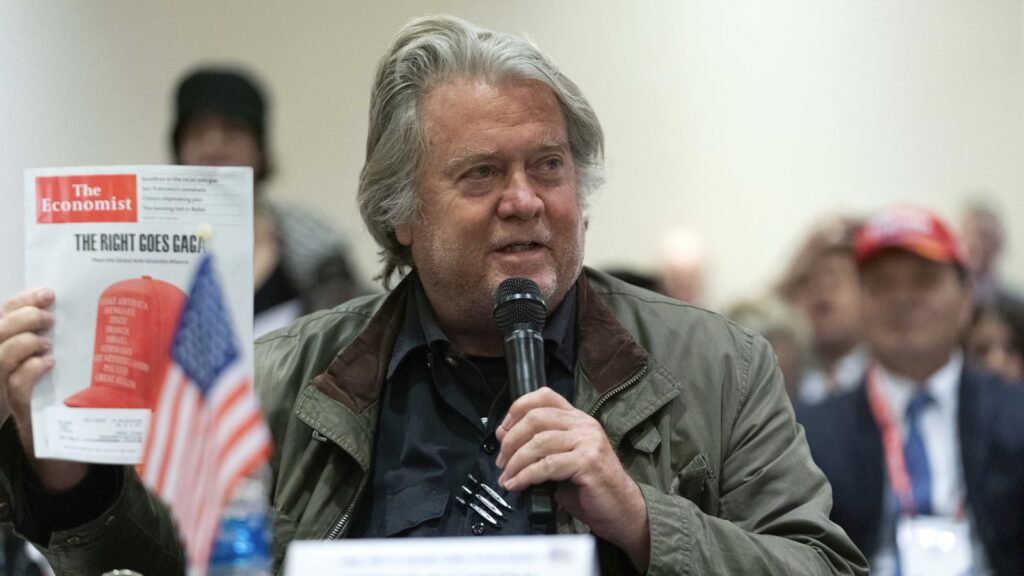
In a provocative interview with The Economist, Steve Bannon, a prominent ally of former President Donald Trump, claimed that Trump would serve “at least” one more term in office. Bannon stated that the leaders of the Make America Great Again (MAGA) movement have devised a plan to circumvent the 22nd Amendment of the U.S. Constitution, which restricts presidents to two terms.
The interview, conducted by Editor-in-Chief Zanny Minton Beddoes and Deputy Editor Edward Carr, was released on The Economist’s website. Notably, it overlooked the “No Kings” protests that saw over 7 million Americans take to the streets on October 18, opposing any moves towards a third Trump term. Bannon insisted that extending Trump’s presidency aligns with the “will of the American people.”
Constitutional Challenges and Political Implications
Bannon’s assertions have sparked significant controversy, as they suggest a direct challenge to the U.S. Constitution. The 22nd Amendment, ratified in 1951, explicitly limits the presidency to two terms. Bannon’s comments have yet to provoke a substantial response from the Democratic Party or major media outlets, including The New York Times.
In the interview, Bannon boldly declared,
“Well, he’s going to get a third term, so Trump 28. Trump is going to be president in 28, and people just ought to get accommodated with that.”
He further suggested that the movement to extend Trump’s presidency is part of a larger “political war” and emphasized the need to “seize the institutions and then purge them.”
Historical Parallels and Expert Opinions
Bannon’s rhetoric draws parallels to historical events, notably Adolf Hitler’s rise to power in Germany. After the failed Munich “Beer Hall Putsch” in 1923, Hitler sought power through the institutions of the Weimar Republic, eventually leading to his appointment as Chancellor in 1933. This historical context raises alarms about the potential erosion of democratic norms in the U.S.
Political analysts and historians have expressed concern over Bannon’s statements. Dr. Jane Smith, a political historian at Georgetown University, noted,
“Bannon’s strategy mirrors tactics used in authoritarian regimes where constitutional norms are subverted to extend power.”
Such comparisons highlight the gravity of Bannon’s claims and the potential consequences for American democracy.
Reactions and the Role of the Democratic Party
Despite the incendiary nature of Bannon’s remarks, the Democratic Party’s response has been muted. House Minority Leader Hakeem Jeffries described the comments as “dangerous authoritarian talk,” while Senate Minority Leader Chuck Schumer called them “chilling.” However, neither leader has called for legal action against Bannon or his associates.
This lack of decisive action has drawn criticism from various quarters. Critics argue that the Democratic Party’s failure to confront such threats head-on could embolden efforts to undermine democratic institutions. The party’s historical reluctance to engage in aggressive political battles, as seen in the 2000 presidential election dispute, underscores this concern.
The Broader Context of Bannon’s Vision
Bannon’s interview also touched on broader economic and social issues. He claimed that Trump’s leadership benefits workers by dismantling “corporatism” and restoring capitalism. These assertions come amid Trump’s controversial pardon of billionaire Changpeng Zhao, highlighting the complex interplay between political rhetoric and economic interests.
Furthermore, Bannon’s comments coincide with Trump’s plans to renovate the East Wing of the White House, funded by major corporate donors. This project symbolizes the intersection of political power and corporate influence, raising questions about the future of democratic governance in the U.S.
International Implications and the Global Context
Bannon positioned his movement as part of a global trend, citing alliances with right-wing parties in Europe, including Nigel Farage’s Reform Party in the UK and Marine Le Pen’s National Rally in France. This international dimension underscores the potential for similar political shifts beyond the U.S.
As Bannon continues to advocate for a third Trump term, the implications for international relations and global stability are significant. The rise of nationalist movements worldwide poses challenges to established democratic norms and could reshape the geopolitical landscape.
The unfolding situation highlights the urgent need for robust democratic safeguards and a vigilant public. As the political landscape evolves, the role of media, political institutions, and civil society in defending democratic principles becomes increasingly critical.
In conclusion, Bannon’s interview with The Economist has ignited a firestorm of debate about the future of American democracy. As the nation grapples with these challenges, the path forward remains uncertain, with the potential for significant political and social upheaval.






